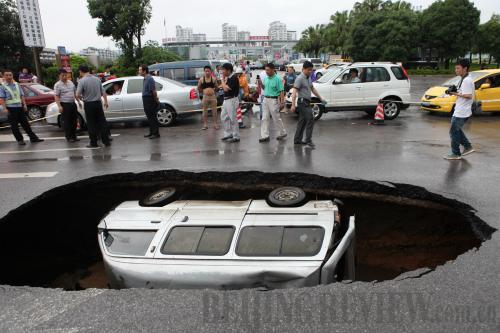|
 |
|
ROAD HAZARD: A road in Guilin, south China's Guangxi Zhuang Autonomous Region, caves in on June 7, engulfing a mini van (CFP) |
The frequent road cave-ins have unnerved residents. Chen Zhejiao, a 25-year-old saleswoman in Beijing, was quoted by Metro Beijing as saying that now she worries about her safety while walking on the street.
A netizen surnamed Yu said that if heavy rain continues to fall on Beijing, the city will probably become a sieve, and every step will be startlingly dangerous.
The road cave-ins suggest structural damage to underground soil, said Sun Jichao, a researcher with the Institute of Hydrogeology and Environmental Geology under the Chinese Academy of Geological Sciences.
"Although road cave-in may happen because of excessive extraction of groundwater, a serious problem in China, nonetheless, recent accidents in Beijing have little to do with that," Sun said. He blamed poorly planned underground infrastructure projects for causing the damage.
Sun's idea is echoed by Zhang Jianguo, an official with the Beijing Municipal Bureau of Land and Resources. Zhang said that Beijing's roads caved in mainly because soil loosened during underground infrastructure construction and water leaked from ruptured underground pipelines.
The earth under Beijing's roads is crisscrossed with public utility networks supplying electricity, telecommunications services, heating and for drainage. Large underground projects such as subways, shops and tunnels are also intensifying.
"The roads are often dug open to install or repair various utility networks, which are managed by different utility providers. Sometimes, the same section of a road is repeatedly dug up and repaved by different departments," said Shan Jingjing, an associate research fellow with the Institute for Urban and Environment Studies under the Chinese Academy of Social Sciences.
If refilled soil has not been sufficiently compacted, loosened soil under the road will be easily washed away by heavy rain, resulting in cavities and road collapses, according to Zhang.
"Road cave-ins used to occur only on automotive lanes, whereas in the last two years they also affected bicycle lanes and pedestrian walks," said Qian Xiaojun, Deputy Director of the Beijing Urban Road Maintenance Management Center.
Sewage pipes and rainwater drainage pipes usually run underneath bicycle lanes and pedestrian walks, which are more likely to cave in after heavy rainfall, said Qiao. He suggested that in the future, these pipelines should be moved beneath lawns to avoid injuries to passers-by.
"If there is no other underground construction project, usually, the road depression will not be very deep," Qiao said.
The roadbed collapse that claimed two lives in Harbin was caused by cracks in an old sewage pipe above an obsolete air-raid shelter. According to the local government, the city had recently been pounded by a series of heavy rains; waters burst an old drainage pipe and flowed into part of an old tunnel built more than four decades ago. Soil was washed into the crumbled ceiling of the shelter, leaving a huge cavity under the pavement. Eventually, the pavement fell apart. The victims plummeted into the accumulated mud in the shelter.
Sun said that underground projects should be monitored and maintained to prevent cavities, and the public should be alerted of safety hazards.
"The government should not just focus on above-ground infrastructure such as railroads, highways and airports while neglecting those underground," said Li Xiaoxi, Deputy Director of the Academic Council of Beijing Normal University.
Email us at: wanghairong@bjreview.com | 